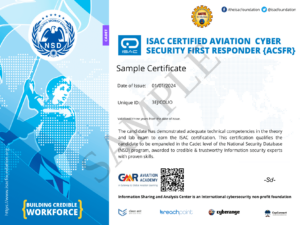The Aviation Cyber Security First Responder (ACSFR) is a unique 30-hour live instructor-led program aimed at all aviation industry employees. The program brings essential awareness in cyber security required for every individual servicing the Aviation Industry.
Gain essential skills and strategies to safeguard personal and organizational data, ensuring confidentiality and integrity in all communications.
Understand the tactics employed by cybercriminals to manipulate individuals into divulging confidential information and learn how to recognize and thwart these attempts effectively.
Develop the ability to identify and respond to various phishing techniques, including spear-phishing and whaling, thereby protecting yourself and your organization from significant financial and reputational damage.
Discover best practices for creating strong passwords and employing effective account management strategies to minimize the risk of unauthorized access.
Learn preventive measures and response strategies to defend against ransomware threats, ensuring the continuity of operations and the safety of critical data.
Acquire knowledge of security protocols and protective measures to safeguard airport infrastructure and passenger information from cyber threats.
Understand the importance of ethical behavior in cybersecurity and how to maintain professionalism, thereby fostering a secure and trustworthy work environment.
This course ‘Professional Ethics at Workplace Plus Program,” by Clean Exit aims to empower the participants to analyze the risks of unethical or illegal behavior triggered by severe circumstances through case studies.
Know MoreGet 60 days access to course videos on the ISAC e-learning portal, updated regularly!

Get listed in the National Security Database program by completing the Aviation Cyber Security First Responder certification. The professionals from NSD effectively respond to aviation security incidents, ensuring the safety of passengers and crew by implementing best practices in security protocols, identifying potential threats, and providing support during emergencies.
Professional Ethics Certification shows the employer that you are less likely to engage in misconducts, frauds and policy violations resulting in reputation or financial loss to the company. More Details
© 2021 All rights reserved | Support Phone: +91 8882-560-560 | SUPPORT@ISACFOUNDATION.ORG
Made with ❤ in India